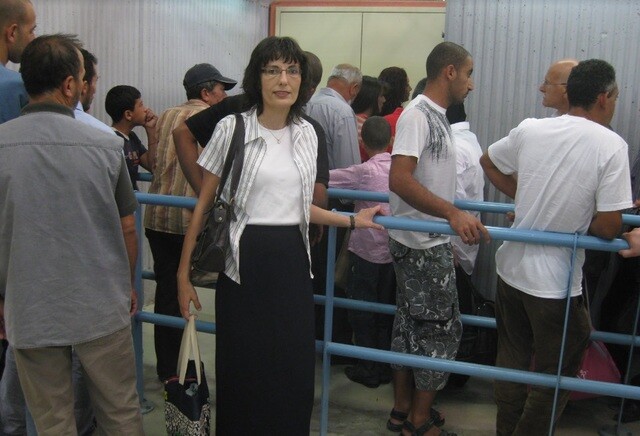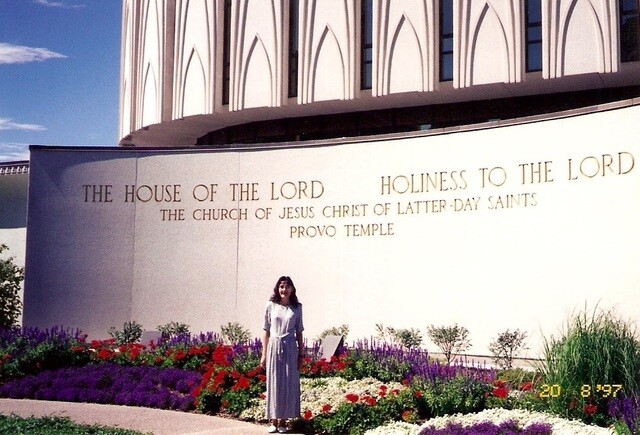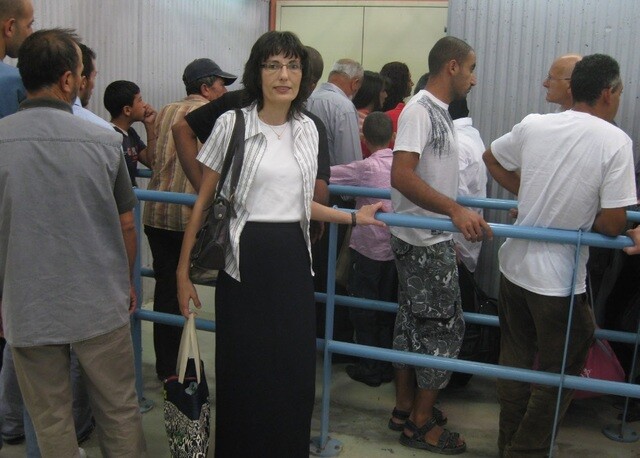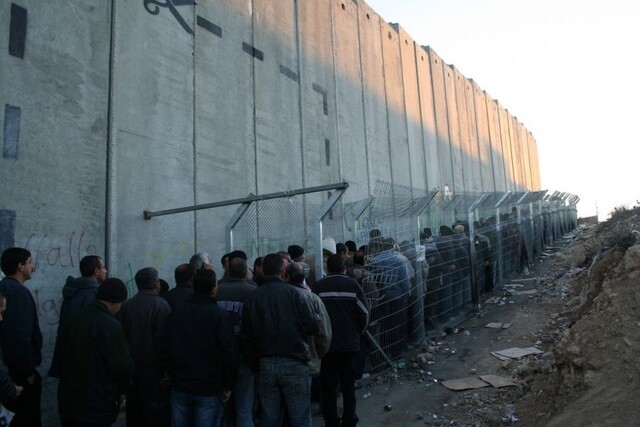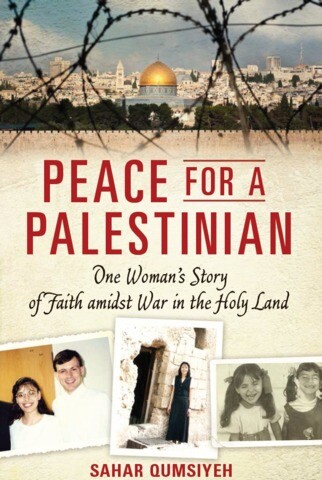“Go home! You can’t enter Jerusalem! Go back!” the soldier at the checkpoint screamed at me. This soldier who had invaded my country was now telling me that I was denied access to the city of my birth. I tried to form angry words to respond to his unjust act but was halted by the words of the Savior echoing in my ear: “Love your enemies.”
Memories flashed through my mind of times when I had seen these soldiers demolish homes of my relatives, beat people until their bones were broken, arrest family members, and prevent me from going to church in Jerusalem and partaking of the sacrament. Images came to my mind of those soldiers invading my sister’s home in the middle of the night, terrorizing her children, and arresting her husband and keeping him in jail with no charge for months.
► You'll also like: After Asking God to End Her Life, This Palestinian Found Peace in the Gospel
Another distinct picture then formed in my mind. This picture was of Isaac, a fellow student at Bethlehem University. I saw him right after he was shot by an Israeli soldier. I saw the bullet hole in his head. All of a sudden, I was again able to smell the tear gas in the air and feel the sad atmosphere at the university that day in 1987. We all stood there and watched as Isaac fought for his life because the soldiers wouldn’t allow him to be taken to a hospital. After his death, I remembered Isaac’s body getting thrown in a hole by the soldiers, preventing his family from giving him a proper burial.

Sahar Qumsiyeh waiting in the long lines to enter Jerusalem
Anger and hate filled my soul, and I thought, How could the Lord expect me to love these soldiers? Is that even possible? After what I have seen some of the soldiers do, He could not possibly expect me to love them! The words came again, now more real to my mind: “Love your enemies.” The Lord’s voice was clearly directed at me. . . .
Finding the Power to Forgive
Shocked by what I had just been commanded to do, I had no power to argue with the solider, and with a heavy heart I turned around to go home. I walked through the fenced pathway that led out of the checkpoint. I looked back at the soldiers and saw that they were turning many people back and denying them entry to Jerusalem. Women were arguing with the soldiers—some telling them that they had to go to the hospital, and some saying they must go to work—but with a rude voice the soldier told them what he had told me a few moments earlier: “Rohk ‘al Beit.” Despite the commotion behind me, as I walked away from the checkpoint, all I could hear were the words “love your enemies” still repeating in my ears. At that moment, it became clear to me that this was a commandment from my Savior, just like any other commandment. He was asking me to love and forgive the Israeli soldiers who brought me and my people so much pain.
Why would the Savior give me a commandment that He knew I could not obey? I thought. I believed that when He gave me a commandment, He would also provide a way to obey it like He did for Nephi (see 1 Nephi 3:7). Even though I knew that principle to be true, every attempt on my part to love and forgive these soldiers was in vain. My hard heart simply could not do it! I prayed for guidance and help but could not feel any change in my feelings. I thought about how I was currently preparing to go through the temple for the first time. How could I enter the Lord’s house without being obedient to all the commandments?
► You'll also like: When a Temple Prompting Led LDS Parents to Speak with the Dad of the Man Who Murdered Their Daughter
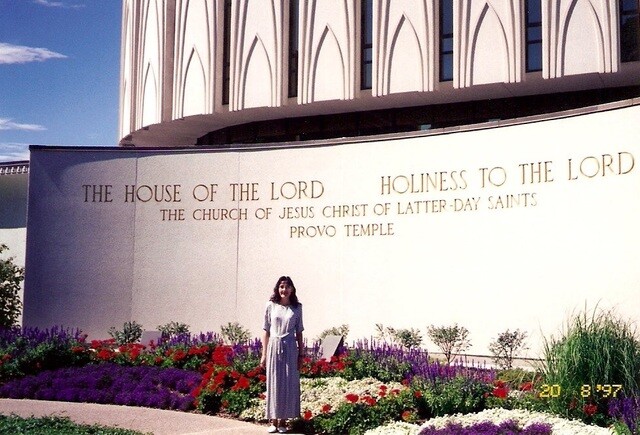
Sahar standing outside the temple after receiving her endowment
After days of spiritual turmoil and confusion, I was led to read Moroni 7:48: “Wherefore, my beloved brethren, pray unto the Father with all the energy of heart, that ye may be filled with this love, which he hath bestowed upon all who are true followers of his Son, Jesus Christ; that ye may become the sons of God; that when he shall appear we shall be like him, for we shall see him as he is; that we may have this hope; that we may be purified even as he is pure.” I felt the prophet Mormon’s words were directed to me. Those words sank deep into my heart, and I pondered them day after day. I realized that charity was a gift from God. All I had to do was desire to have it with all my heart, and then I could pray to my Heavenly Father, and He would give me this divine gift.
Could the Savior really teach me how to love? I knew that I could not find love for those soldiers, nor could I forgive them, by my efforts alone. My mortal heart simply could not let go of the past. I needed the Atonement. I needed the Savior’s enabling power and His perfect love to fill my heart. The Savior’s last words as He hung on the cross in agony were, “Father, forgive them; for they know not what they do” (Luke 23:34). In this astonishing example, the Savior was able to forgive the soldiers that had crucified Him! He not only forgave them, but He also prayed for them! The soldiers I was trying to forgive certainly didn’t whip me or crucify me, so how could I justify not forgiving them? Clearly, there was someone who knew how to forgive and love, and that was my Savior and Redeemer. . . .
Read more of Sahar's remarkable story in Peace for a Palestinian:One Woman's Story of Faith Amidst War in the Holy Land.
Sahar Qumsiyeh was born into a loving Christian family in Jerusalem and raised in Beit Sahour, near Bethlehem. Growing up in a country torn apart by political upheaval, Sahar struggled with feelings of hopelessness and anger as she watched her people being persecuted, tormented, and even killed.
In Peace for a Palestinian, Sahar shares her experience desperately searching for peace and joy only to find that true peace lies not in external resolution but in following the Savior. As she explains, "We may live in a place with barriers, checkpoints, and restrictions, but we can feel liberated by His Atonement."
Loving as the Savior Loves
I determined to ask Heavenly Father for help. I knelt down and prayed. I must say that I was disappointed because I expected a miraculous change in my heart and my feelings right away. That did not happen. I continued to fast and pray, being confident that one day my prayer would be answered.
My heart was so hard that it took months for Heavenly Father to mold it and soften it. Almost a year after that event, I was heading to church on a normal Sabbath. I was prepared to be turned back, as the Bethlehem checkpoint had gotten even harder to cross. I still waited and hoped, just as I had almost a year earlier. The soldier at the checkpoint was not allowing anyone in that day. He demanded that everyone leave and said no one could enter. I looked at the fathers who were eager to go to Jerusalem to work in order to obtain food for their families, at the children who were in school attire with their backpacks on, and at the many others who were carrying medical records and x-rays. My heart broke for them because, for me, it was only church that I would be missing.
► You'll also like: How a Muslim's Prayer Helped a Mormon Get Past Israeli Soldiers to Attend Church
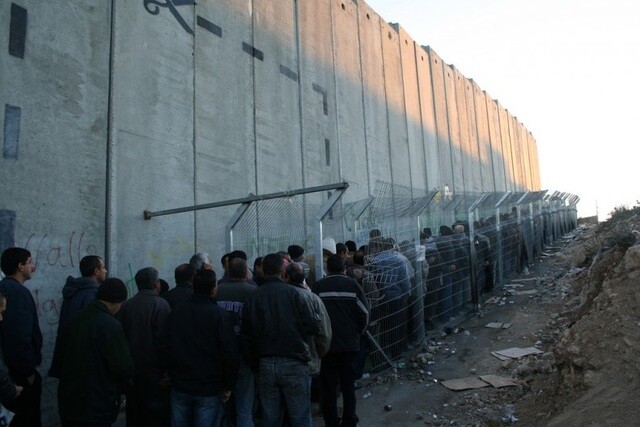
A line at an Israeli checkpoint
“Everyone, go home,” I heard the soldier repeat. At this same place, just a year earlier, I had heard the Savior’s inviting commandment to love my enemies. Now, as I looked up at the soldier’s face, I expected to find the same hate and anger that I had found last year. This time, however, my heart seemed different. As I looked into the soldier’s eyes, my heart filled with love instead of hate. These feelings of love shocked me.
I had been unaware of the gradual change in my feelings, and I still questioned my ability to love these soldiers. But as I looked at that solider that day, I saw a brother of mine—a brother not only because Palestinians and Israelis are literally related by blood but also because in front of me stood a son of God, beloved of Him. I could feel Heavenly Father’s love for that soldier. In my mind, I was able to isolate every bad thing I had seen the soldiers do. I still hated those acts, but my hate for the soldiers themselves was gone. I was finally able to love my enemies! Like Jesus forgave the Roman soldiers who nailed Him to a cross, I could love those soldiers who hurt my people. This feeling of charity and forgiveness did not come from me. These feelings were given to me because of my faith in the Atonement of Jesus Christ and because I trusted in Him and asked for His help. It was the Savior that filled my heart with His love.
Corrie Ten Boom, a Christian who hid Jews from the Nazis and survived their concentration camp, wrote of her encounter with one of the guards: “I discovered that it is not on our forgiveness any more than on our goodness that the world’s healing hinges, but on His. When He tells us to love our enemies, He gives, along with the command, the love itself” (The Hiding Place, by Corrie ten Boom, John Sherrill, and Elizabeth Sherrill [Bantam edition, 1974], 238. . . .
I testify that charity is essential for our spiritual well-being. It is essential not only because it is a commandment from God to love others but also because letting go of anger and hate is liberating. One day, my friends and I waited in line for a very long time to cross the Qalandia checkpoint. We waited in multiple lines for an hour or so each, and each time, when it was our turn, the soldier at the gate would say, “This path is closed. Go to a different line.” After this happened two or three times, one of my friends got very upset. Later she asked me, “How can you deal with this injustice and not get angry?” I told her that if I let myself get angry each time something like this happened, I would be angry all my life. As I have learned to love my enemies, I have also realized that at some point in your life, you have to learn to let go. Being angry and hateful toward others only hurts you. My faith and feelings of peace have intensified by learning to love and forgive as exemplified by our Savior Jesus Christ.
All images courtesy of Sahar Qumsiyeh
Read more of Sahar's remarkable story in Peace for a Palestinian:One Woman's Story of Faith Amidst War in the Holy Land.
Sahar Qumsiyeh was born into a loving Christian family in Jerusalem and raised in Beit Sahour, near Bethlehem. Growing up in a country torn apart by political upheaval, Sahar struggled with feelings of hopelessness and anger as she watched her people being persecuted, tormented, and even killed.
In Peace for a Palestinian, Sahar shares her experience desperately searching for peace and joy only to find that true peace lies not in external resolution but in following the Savior. As she explains, "We may live in a place with barriers, checkpoints, and restrictions, but we can feel liberated by His Atonement."
